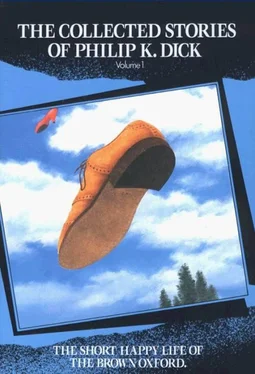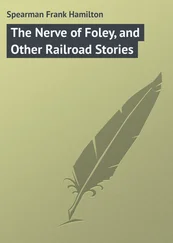The blue prowler was a larger Nanny, built to manage two young boys. Its sides were dented and warped from use, but its grapples were still strong and powerful. In addition to the usual reinforced plates across its nose there was a gouge of tough steel, a jutting jaw that was already sliding into position, ready and able.
Mecho-Products, its manufacturer, had lavished attention on this jaw-construction. It was their trademark, their unique feature. Their ads, their brochures, stressed the massive frontal scoop mounted on all their models. And there was an optional assist: a cutting edge, power-driven, that at extra cost could easily be installed in their “Luxury-line” models.
This blue Nanny was so equipped.
Moving cautiously ahead, the blue Nanny reached the fence. It stopped and carefully inspected the boards. They were thin and rotted, put up a long time ago. It pushed its hard head against the wood. The fence gave, splintering and ripping. At once the green Nanny rose on its back treads, its grapples leaping out. A fierce joy filled it, a bursting excitement. The wild frenzy of battle.
The two closed, rolling silently on the ground, their grapples locked. Neither made any noise, the blue Mecho-Products Nanny nor the smaller, lighter, pale-green Service Industries, Inc., Nanny. On and on they fought, hugged tightly together, the great jaw trying to push underneath, into the soft treads. And the green Nanny trying to hook its metal point into the eyes that gleamed fitfully against its side. The green Nanny had the disadvantage of being a medium-priced model; it was outclassed and outweighed. But it fought grimly, furiously.
On and on they struggled, rolling in the wet soil. Without sound of any kind. Performing the wrathful, ultimate task for which each had been designed.
“I can’t imagine,” Mary Fields murmured, shaking her head. “I just don’t know.”
“Do you suppose some animal did it?” Tom conjectured. “Are there any big dogs in the neighborhood?”
“No. There was a big red Irish setter, but they moved away, to the country. That was Mr. Petty’s dog.”
The two of them watched, troubled and disturbed. Nanny lay at rest by the bathroom door, watching Bobby to make sure he brushed his teeth. The green hull was twisted and bent. One eye had been shattered, the glass knocked out, splintered. One grapple no longer retracted completely; it hung forlornly out of its little door, dragging uselessly.
“I just don’t understand,” Mary repeated. “I’ll call the repair place and see what they say. Tom, it must have happened sometime during the night. While we were asleep. The noises I heard—”
“Shhh,” Tom muttered warningly. Nanny was coming toward them, away from the bathroom. Clicking and whirring raggedly, she passed them, a limping green tub of metal that emitted an unrhythmic, grating sound. Tom and Mary Fields unhappily watched her as she lumbered slowly into the living room. “I wonder,” Mary murmured.
“Wonder what?”
“I wonder if this will happen again.” She glanced up suddenly at her husband, eyes full of worry. “You know how the children love her … and they need her so. They just wouldn’t be safe without her. Would they?”
“Maybe it won’t happen again,” Tom said soothingly. “Maybe it was an accident.” But he didn’t believe it; he knew better. What had happened was no accident.
From the garage he backed his surface cruiser, maneuvered it until its loading entrance was locked against the rear door of the house. It took only a moment to load the sagging, dented Nanny inside; within ten minutes he was on his way across town to the repair and maintenance department of Service Industries, Inc.
The serviceman, in grease-stained white overalls, met him at the entrance. “Troubles?” he asked wearily; behind him, in the depths of the block-long building, stood rows of battered Nannies, in various stages of disassembly. “What seems to be the matter this time?”
Tom said nothing. He ordered the Nanny out of the cruiser and waited while the serviceman examined it for himself.
Shaking his head, the serviceman crawled to his feet and wiped grease from his hands. “That’s going to run into money,” he said. “The whole neural transmission’s out.”
His throat dry, Tom demanded: “Ever seen anything like this before? It didn’t break; you know that. It was demolished.”
“Sure,” the serviceman agreed tonelessly. “It pretty much got taken down a peg. On the basis of those missing chunks—” He indicated the dented anterior hull-sections. “I’d guess it was one of Mecho’s new jaw-models.”
Tom Fields’s blood stopped moving in his veins. “Then this isn’t new to you,” he said softly, his chest constricting. “This goes on all the time.”
“Well, Mecho just put out that jaw-model. It’s not half bad … costs about twice what this model ran. Of course,” the serviceman added thoughtfully, “we have an equivalent. We can match their best, and for less money.”
Keeping his voice as calm as possible, Tom said: “I want this one fixed. I’m not getting another.”
“I’ll do what I can. But it won’t be the same as it was. The damage goes pretty deep. I’d advise you to trade it in-you can get damn near what you paid. With the new models coming out in a month or so, the salesmen are eager as hell to—”
“Let me get this straight.” Shakily, Tom Fields lit up a cigarette. “You people really don’t want to fix these, do you? You want to sell brand-new ones, when these break down.” He eyed the repairman intently. “Break down, or are knocked down.”
The repairman shrugged. “It seems like a waste of time to fix it up. It’s going to get finished off, anyhow, soon.” He kicked the misshapen green hull with his boot. “This model is around three years old. Mister, it’s obsolete.”
“Fix it up,” Tom grated. He was beginning to see the whole picture; his self-control was about to snap. “I’m not getting a new one! I want this one fixed!”
“Sure,” the serviceman said, resigned. He began making out a work-order sheet. “We’ll do our best. But don’t expect miracles.”
While Tom Fields was jerkily signing his name to the sheet, two more damaged Nannies were brought into the repair building.
“When can I get it back?” he demanded.
“It’ll take a couple of days,” the mechanic said, nodding toward the rows of semi-repaired Nannies behind him. “As you can see,” he added leisurely, “we’re pretty well full-up.”
“I’ll wait,” Tom said tautly. “Even if it takes a month.”
“Let’s go to the park!” Jean cried.
So they went to the park.
It was a lovely day, with the sun shining down hotly and the grass and flowers blowing in the wind. The two children strolled along the gravel path, breathing the warm-scented air, taking deep breaths and holding the presence of roses and hydrangeas and orange blossoms inside them as long as possible. They passed through a swaying grove of dark, rich cedars. The ground was soft with mold underfoot, the velvet, moist fur of a living world beneath their feet. Beyond the cedars, where the sun returned and the blue sky flashed back into being, a great green lawn stretched out.
Behind them Nanny came, trudging slowly, her treads clicking noisily. The dragging grapple had been repaired, and a new optic unit had been installed in place of the damaged one. But the smooth coordination of the old days was lacking; and the clean-cut lines of her hull had not been restored. Occasionally she halted, and the two children halted, too, waiting impatiently for her to catch up with them.
“What’s the matter, Nanny?” Bobby asked her.
“Something’s wrong with her,” Jean complained. “She’s been all funny since last Wednesday. Real slow and funny. And she was gone, for awhile.”
Читать дальше












